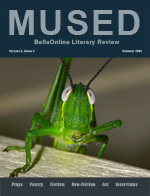Momīs Fall from Grace
Connie Mulloy
Steinbeck said it best, in East Of Eden (published in 1952). "When a child first catches adults out - when it first walks into his grave little head that adults do not have divine intelligence, that their judgements are not always wise, their thinking not always true, their sentences just - his world falls into panic desolation. The gods are fallen and all safety gone. And there is one sure thing about the fall of gods: they do not fall a little; they crash and shatter or sink deeply into green muck. It is a tedious job to build them up again; they never quite shine. And the childīs world is never quite whole again. It is an aching kind of growing."
This is why we need the written word. To share our insights and feelings, and to remind each other, we are not alone. Did Steinbeck know he would be talking about my fall from grace; in 2008, in my home in rural Maryland? I think he did. I think what he says is universal for almost all of us with children, if not yet, then some day.
When I was in college I used to have a nightmare that I skipped so many high school classes I couldnīt even find the room to take my final exam, and therefore I failed and my diploma was an accident waiting to be taken from me at any time. I had the same dream after college about my degree.
Funny, but I never dreamt any such thing about parenting. I knew I was flawed, and made mistakes. "Iīm sorry," are not foreign words for me. I admit my mistakes and have tried to teach my children that making mistakes makes you human, itīs how you deal with the mistakes you make that defines you. I didnīt ask to be put on a pedestal, but I wasnīt completely unaware that while they were young anyway, I had my childrenīs admiration and respect. Like the day my youngest daughter brought her first grade teachers pencil sharpener home to fix.
"Why," I asked, "did your teacher send this home to me?"
"I told her you can fix anything." she answered, without hesitation.
I fixed it.
I wasnīt ready to fall.
I figured something was stuck in the hole, and I got lucky banging it on the desk. The stuck lead fell out and I had a reprieve for a little while at least.
But itīs inevitable.
Itīs not my youngest whoīs suffering my fall . . . yet.
Itīs my seventeen year old son.
He knows I canīt fix everything. He wouldnīt trust me with his pencil sharpener, let alone his lifeīs journey.
Heīs seen me react to stress in a less than perfect manner.
Heīs also seen me pick myself up and start over again, but he didnīt notice that part. His "panicked desolation" was too great for him to see past it. Now he doesnīt trust any of my judgements. He thinks he has to do it all alone. Make all of his own decisions, right or obviously (to anyone over 25) wrong.
Itīs hard to face life as a fallen god. Even when you never asked to be a god.
Itīs hard to watch their disdain for you. Harder still to realize, itīs a part of life.
Certainly it has been since 1952, but I suspect even way before that.
I know this is a necessary part of his growing into a person who trust his own flawed decision making. As I said, mistakes are inevitable, itīs how we deal with them that defines us.
So far he seems to deal with them by thinking theyīre the fault of those around him. This is normal too, a lack of maturity will keep you from owning your mistakes and taking the consequences for them.
Now itīs my turn to trust him.
I need to trust that heīll find his way, like I did. Like Steinbeckīs character, Adam Trask did.
I know it wonīt be a perfect life, thereīs no such thing, but I trust that heīll do whatīs best for him, if not right off, then eventually.
I think itīs funny that we think things are harder now, for our children, for ourselves. Maybe this is because we donīt read enough. Certainly, literature shows we humans have had the same basic struggles since man put pen to paper. We just forget to pick our heads up from our suffering. Like our children, we need to learn from each other, from Steinbeck, and the other moms in the PTA. Maybe it will keep us from making the same mistakes they do, or maybe it will comfort us in our humanity, and teach us how to best pick ourselves up, and define ourselves in how we choose to fix the mistakes we make.
Sometimes, funny isnīt the kind that make us laugh out loud. Sometimes funny is learning something new.
We have a new baby in the house. I call him Spike. Heīs a product of good cockatiel loving. Iīve watched the parents take excellent care of him, and I know, in less time then Iīve had, theyīll have to wean him and put him on his own perch to grow.
I feel for those parents.
I feel for that baby.
How scary to hold yourself up, and get your balance, and figure out what to do.
How hard to let him, and not catch him every time he falls.
How funny, to see your own life mirrored, in a bird cage.

